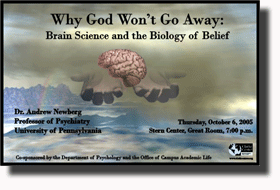Thursday , October 6, 2005
Why God Won’t Go Away: Brain Science and the Biology of Belief
Stern Center, Great Room 7:00 P.M.

Issue in Context
Many minds of the 19th century viewed religion as mere superstition which an increasingly enlightened society would soon discard. Yet today, in the most technologically and scientifically enlightened age, religious observance remains strong in the United States: church affiliation has never been higher, and more than seventy percent of the American population claims to believe in God.
Dr. Andrew Newberg, professor of psychiatry at the University of Pennsylvania, examines whether or not religion is the product of biology, a kind of neurological illusion. Do our brains function in such a way as to make God seem not only real, but reachable?
Together with the late Dr. Eugene d’Aquili, Dr. Newberg conducted research using advanced imaging techniques to gain a further understanding of what occurs inside the brains of Buddhist and Franciscan nuns at prayer. What they discovered was that intensely focused spiritual contemplation triggers an alteration in the activity of the brain that leads one to perceive transcendent religious experiences as solid, tangible reality. This discovery suggests that God seems to be hard-wired into the brain.
Such compelling research and evidence raises a very controversial debacle: whether or not God was created by, or is the creator of, the brain.
About the Speaker
Dr. Andrew Newberg is currently a professor in the Department of Radiology and Psychiatry at the hospital of the University of Pennsylvania and is a staff physician in nuclear medicine. He graduated from the University of Pennsylvania School of Medicine in 1993. He did his training in Internal Medicine at the Graduate Hospital in Philadelphia, serving as chief resident in his final year.
Following his internal medicine training, he completed a fellowship in nuclear medicine in the Division of Nuclear Medicine, Department of Radiology, at the University of Pennsylvania. He has actively pursued a number of neuroimaging research projects which have included the study of aging and dementia, epilepsy, and other neurological and psychiatric disorders. His research has focused not only on specific disorders, but on various activation studies designed to explore how brain function is associated with various mental states. He has published numerous articles and chapters on the topics of brain function and neuroimaging and has presented his research at both national and international meetings.
He also has made education an important part of his career, participating on education and
curriculum committees both at the University of Pennsylvania and at Graduate Hospital. He has trained medical students, internal medicine residents, radiology residents, and nuclear medicine fellows. He is board certified in Internal Medicine, Nuclear Medicine, and Nuclear Cardiology.
